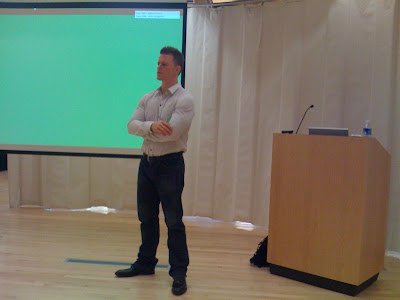 Robert Rasmussen is an executive creative director at R/GA, where he oversees their work for Nike. Before arriving at R/GA, Rasmussen made his way through Wieden + Kennedy and JWT New York. Like most everyone else at the conference, he's won lots of awards for his work, but perhaps more importantly, he's led and been involved in a great deal of highly integrated work that spanned television, web, print, direct marketing, mobile, and retail.
Robert Rasmussen is an executive creative director at R/GA, where he oversees their work for Nike. Before arriving at R/GA, Rasmussen made his way through Wieden + Kennedy and JWT New York. Like most everyone else at the conference, he's won lots of awards for his work, but perhaps more importantly, he's led and been involved in a great deal of highly integrated work that spanned television, web, print, direct marketing, mobile, and retail.Initially, there was some discussion about how "interactive" and "traditional" have collided in the advertising industry. I don't think this was a revelation to anyone, but it led to Robert indicating where the sweet spot lies for digital content as far as how consumers engage with it. That sweet spot lies somewhere near the intersection of information, community, utility, and entertainment (I think I would have included "storytelling" in there too, but he left that out). That's a lot to consider beyond the "storytelling and entertainment" role that a lot of more traditional advertising tends to take.
 Robert's presentation focused largely on explaining the way R/GA structures its creative department so as to illustrate how that varies from most agencies, and how it can lead to a more collaborative creative process. According to Rasmussen, the creative team at R/GA can, and often does, include an art director, copywriter, interaction designer (information architect), visual designer (graphic designer), technologist, emerging media specialist, video content producers, and perhaps even a retail specialist. Its an indication of the unique kind of creative process that takes place with an interactive project. Food for thought for those who think that a creative team includes just a copywriter and an art director.
Robert's presentation focused largely on explaining the way R/GA structures its creative department so as to illustrate how that varies from most agencies, and how it can lead to a more collaborative creative process. According to Rasmussen, the creative team at R/GA can, and often does, include an art director, copywriter, interaction designer (information architect), visual designer (graphic designer), technologist, emerging media specialist, video content producers, and perhaps even a retail specialist. Its an indication of the unique kind of creative process that takes place with an interactive project. Food for thought for those who think that a creative team includes just a copywriter and an art director.Another thing that Robert pointed out is that R/GA doesn't really employ account executives or project managers. I was pretty surprised to hear that. My first thought was "Doesn't that make your organization more like a production company?" Which leads me to what I saw as the crux of the conversation: what is the future of an interactive agency versus that of an interactive production house? While there have been very few "traditional" agencies that have proven they really know the interactive space, there have been just as few "interactive agencies" that have proven they can really do much more than interactive work. The leaders of the industry are those that know it all and show how great, truly integrated work comes from a big idea, executed flawlessly in a variety of media.
 As more and more agencies become all-encompassing service centers for brands, the onus will be on interactive shops to truly become agencies in the broader sense, or else focus specifically on the interactive craft and take a role alongside the broadcast production companies that do such great work bringing ideas to life in their respective discipline. It seems many interactive shops have a chip on their shoulder about the idea of being a production company. I don't understand this, since I've never known anyone at a broadcast production company to take this kind of an attitude. As I said, they are the people the industry goes to in order bring ideas to life in the best way possible. They are the creative partners who's vision can be incorporated with the vision of the idea in order to make it better.
As more and more agencies become all-encompassing service centers for brands, the onus will be on interactive shops to truly become agencies in the broader sense, or else focus specifically on the interactive craft and take a role alongside the broadcast production companies that do such great work bringing ideas to life in their respective discipline. It seems many interactive shops have a chip on their shoulder about the idea of being a production company. I don't understand this, since I've never known anyone at a broadcast production company to take this kind of an attitude. As I said, they are the people the industry goes to in order bring ideas to life in the best way possible. They are the creative partners who's vision can be incorporated with the vision of the idea in order to make it better.Rasmussen assured us that R/GA is an interactive shop that is blossoming into an agency in the broader sense, beefing up their staffing for broader media offerings, and pursuing client relationships that are based on more than digital work. I have faith that R/GA will be one of those leaders in the industry that can and will make the metamorphosis. I'm not so sure there will be a ton of other interactive shops that will be able to claim the same thing in two or three years.
No comments:
Post a Comment